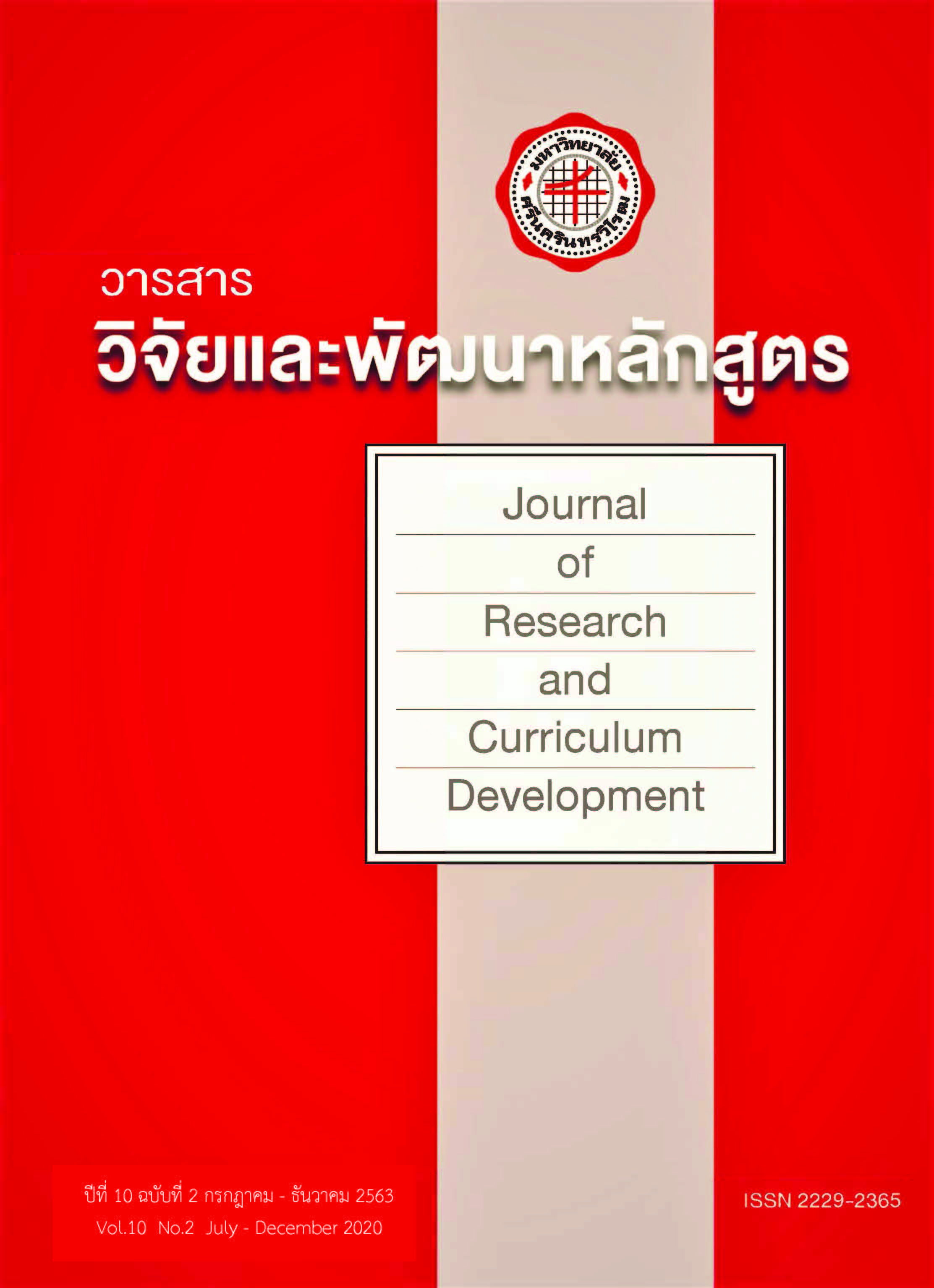ผลการจัดการเรียนรู้โดยใช้ปัญหาเป็นฐานร่วมกับบทเรียนอีเลิร์นนิงเพื่อพัฒนาผลสัมฤทธิ์ทางการเรียน เรื่อง การเขียนโปรแกรมของนักเรียนชั้นมัธยมศึกษาปีที่ 4
Keywords:
Problem-besed, e-learning, programming, Computing ScienceAbstract
The objective of this research was developed and examine the problem-based learning with e-learning to enhance learning achievement on programing subject of grade 10. The samples group of the research consisted of grade 10 students in the second semester of the academic year 2018 at Bodindecha (Sing Singhaseni) who were selected by the Cluster Random Sampling method for 2 classrooms, 82 students in total. The research instruments included the quality assessment of the learning management plans, the assessment of quality on the e-Learning and the learning achievement test on Programing subject. The results of this research revealed that the overall quality of learning management plans was very good ( = 4.73) , the overall quality of e-learning was very good ( = 4.70), the efficiency of the e-learning lessons on programing subject (E1/E2) is equal to 88.97/81.41, which meets the standard criteria of 80/80 ,achievement test reliability level was 0.82 and the learning achievement of students after learning with problem-based learning with e-learning was higher than before learning with statistically significant level of .05
References
2.ชัยยงค์ พรหมวงศ์. (2556). การทดสอบประสิทธิภาพสื่อหรือชุดการสอน. วารสารศิลปากรศึกษาศาสตร์วิจัย. 5(1), 7-19.
3.ปองทิพย์ เทพอารีย์. (2559). การจัดการเรียนรู้โดยใช้ปัญหาเป็นฐาน : การจัดกิจกรรมการเรียนรู้ที่สอดคล้องกับการเรียนรูในศตวรรษที่ 21 หมวดวิชาศึกษาทั่วไป ระดับอุดมศึกษา. วารสารวิจัยและพัฒนาหลักสูตร. 6(1), 1-14.
4.พิชิต ฤทธิ์จรูญ. (2556). หลักการวัดและประเมินผลการศึกษา. กรุงเทพฯ : เฮ้าส์ ออฟ เคอร์มิสท์.
5.พรรณี ลีกิจวัฒนะ. (2558). วิธีการวิจัยทางการศึกษา. (พิมพ์ครั้งที่ 10). กรุงเทพฯ : มีน เซอร์วิส ซัพพลาย.
6.รวีวัฒน์ สิริบาล. (2553). แนวทางการเขียนแผนการจัดการเรียนรู้ให้มีคุณภาพ. วารสารวิชาการกระทรวงศึกษาธิการ.
2(11), 19 – 23.
7.วรรธนะ คัทจันทร์. (2558). ผลของการใช้บทเรียนอีเลิร์นนิ่งโดยใช้ปัญหาเป็นฐานที่ส่งผลต่อเจตคติและผลสัมฤทธิ์ทางการเรียนวิชาสร้างผลงานด้วย คอมพิวเตอร์ สำหรับนักเรียนชั้นมัธยมศึกษาปีที่ 4. วิทยาศาสตรมหาบัณฑิต.ครุศาสตร์อุตสาหกรรม. สถาบันเทคโนโลยีพระจอมเกล้าเจ้าคุณทหารลาดกระบัง.
8.สถาบันส่งเสริมการสอนวิทยาศาสตร์และเทคโนโลยี (สสวท.). (2560). คู่มือการใช้หลักสูตรรายวิชาพื้นฐานวิทยาศาสตร์. ค้นเมื่อ 20 มีนาคม 2562, สืบค้นจาก https://www.ipst.ac.th/index.php
9.อรุณรุ่ง ปภาพสิษฐ. (2551) . Problem-Based Learning : การเรียนที่ใช้ปัญหาเป็นหลัก. ค้นเมื่อ 20 มีนาคม 2562, สืบค้นจากhttps://www.pnru.ac.th/fac/tedu/uploadfiles/uploadfile/29/6e682264abd39e8c64b39960ff4c2a0b.pdf
10.Anderson, L. W., & Krathwohl, D. Eds. (2001). A taxonomy for learning, teaching, and assessing: A revision of Bloom's taxonomy of educational objectives. New York : Longman.
11.Hmelo-silver, C.E. (2004). Problem-based learning : What and how do students learn?. Education Psychology Review, 16(3), p.235-266
12.Seels, B., & Glasgow, Z. (1990). Exercise in instructional design. Columbus, OH:Merrill.





